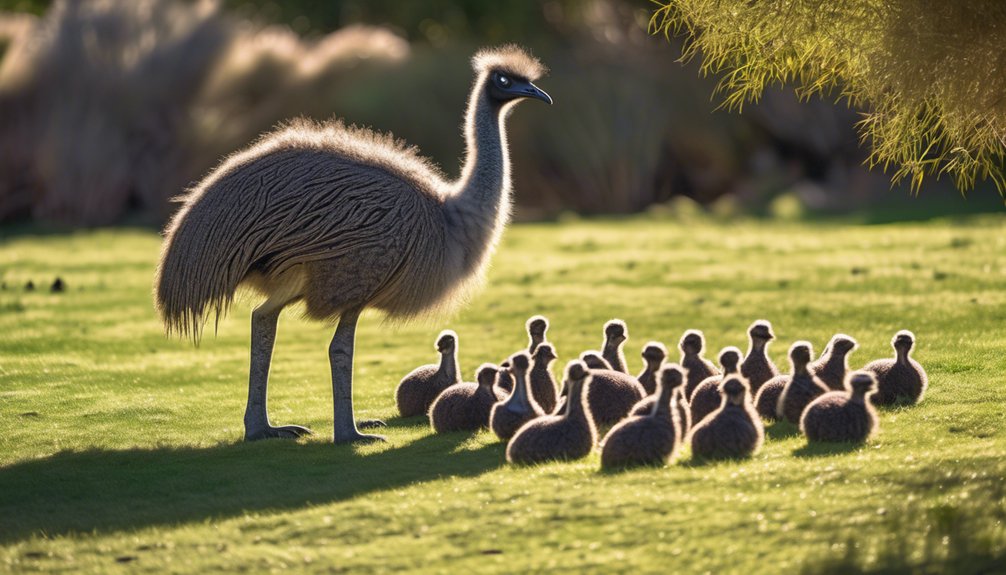
When considering emu parenting, it's essential to focus on the male's pivotal role in nurturing the young. Unlike many bird species, male emus take charge from egg incubation to chick rearing, showcasing behaviors that are both fascinating and critical for survival. As you explore their nesting habits and the challenges they face, you'll uncover insights that reveal the complexities of their parenting strategies and their impact on conservation efforts.
Key Takeaways
- Male emus are the primary caregivers, responsible for protecting and nurturing chicks, challenging traditional views of animal parenting roles.
- They select secure nesting sites and construct nests using natural materials to ensure optimal conditions for egg incubation.
- Males incubate the eggs for 50 to 60 days without eating, maintaining precise temperature and turning the eggs regularly for even heating.
- After hatching, males guide chicks to food and water while teaching essential survival skills for about six months.
- The involvement of male emus significantly enhances chick survival rates, contributing to the overall reproductive success of the species.
The Unique Role of Male Emus in Parenting
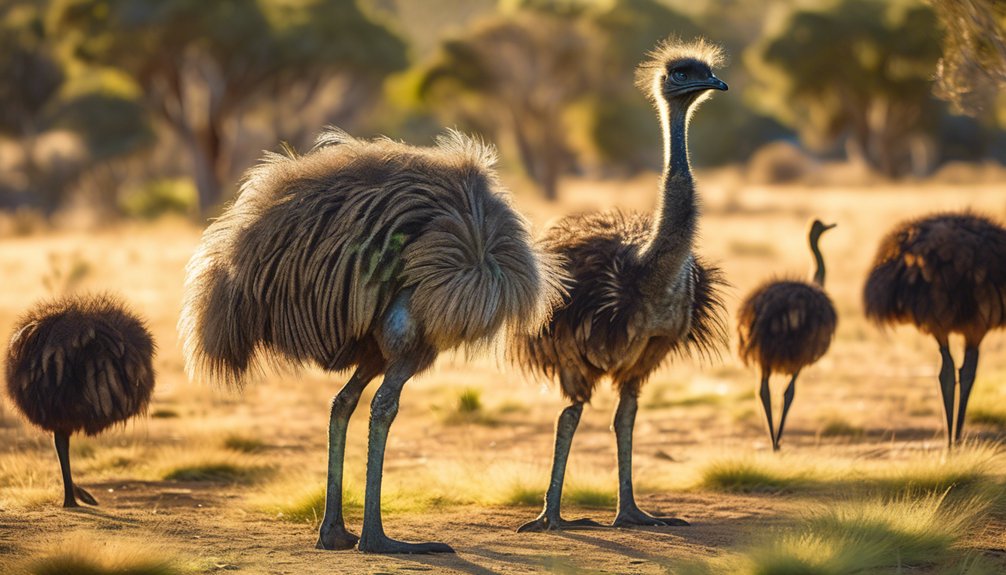
While many might assume that parenting roles in the animal kingdom are largely maternal, male emus challenge this norm by taking on the primary responsibility for raising their young.
You'll notice their remarkable behaviors, which include building nests and incubating eggs. Male emus exhibit strong parenting instincts, showing dedication as they protect their chicks from predators.
These behaviors highlight their commitment and ability to nurture, often surprising those who overlook paternal roles in nature. As a male emu, you'd not only provide warmth and safety but also teach your young essential survival skills.
This unique role emphasizes the importance of male participation in animal parenting, reshaping our understanding of familial dynamics in the wild.
Egg Incubation: A Male Emu's Responsibility
As the sole incubator of the eggs, a male emu plays a critical role in ensuring the survival of his future chicks.
He carefully monitors the egg temperature, maintaining it at a precise range between 97 and 100 degrees Fahrenheit. This temperature regulation is vital for successful development.
Over an incubation duration of about 50 to 60 days, the male emu remains dedicated, turning the eggs regularly to promote even heating. His commitment doesn't waver, even in harsh weather conditions, as he instinctively understands that each moment counts.
The Nesting Process: Building a Safe Environment
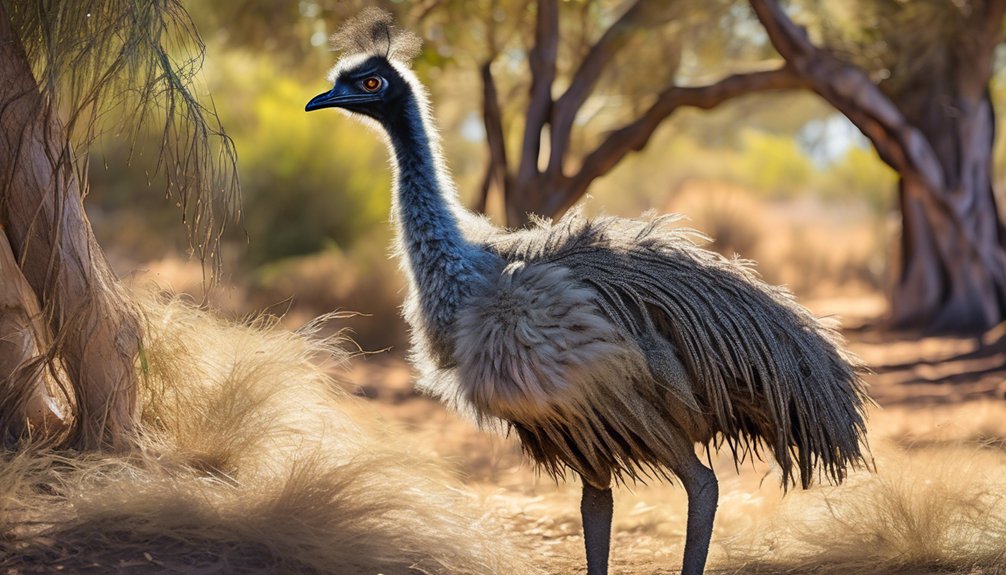
To ensure a successful incubation, the male emu diligently constructs a nest that serves as a safe haven for his precious eggs. He meticulously searches for suitable nesting materials, such as grasses, leaves, and feathers, carefully layering them to provide warmth and protection.
This process isn't just about physical comfort; it's also about creating a sense of security. You'll notice him selecting safe locations, often hidden among shrubs or tall grasses, where potential threats are minimized.
Timeframe of Incubation and Hatching
After the male emu completes the careful nesting process, the focus shifts to the incubation phase.
You'll notice that the incubation duration typically spans about 56 to 62 days. During this time, the male emu takes on the crucial role of incubator, diligently sitting on the eggs to maintain the perfect temperature. He'll often shift positions to ensure even warmth, a testament to his commitment.
As the days progress, a palpable energy surrounds the nest, hinting at the impending hatching process. When the moment arrives, you can expect a remarkable sight: the male emu often remains protective, guiding his newly hatched chicks as they emerge into the world.
This delicate balance of care underscores the male's profound role in emu parenting.
The Bond Between Male Emus and Their Chicks

Once the chicks hatch, the bond that develops between the male emu and his offspring is both fascinating and essential for their survival.
You'll notice the male's attentive nurturing, characterized by bonding behaviors such as gentle nudging and close proximity. This physical connection helps reassure the chicks, fostering a sense of safety.
Moreover, chick communication plays a crucial role; their soft peeps prompt the father to respond with protective gestures and movements. As the chicks grow, this interaction strengthens their relationship, ensuring they feel secure in their environment.
Observing these moments highlights the emotional nuances of emu parenting, revealing the depth of connection that enhances the survival of the young. Emus truly exemplify the beauty of parental bonds in the animal kingdom.
Feeding and Protecting the Young
As the chicks begin to explore their surroundings, the male emu takes on the vital roles of feeding and protecting them. This phase is crucial for their development, ensuring they thrive in their new environment.
You might observe him engaging in:
- Carefully selecting nutrient-rich vegetation for chick feeding
- Leading the chicks to fresh water sources
- Keeping a vigilant eye for potential predators
- Using vocalizations to communicate safety
- Shielding them with his body during threats
Through these actions, the male emu exemplifies parental protection, instilling a sense of security in his young.
His nurturing not only provides sustenance but also teaches them vital survival skills, reinforcing the bond that will last a lifetime.
Behavioral Traits of Male Emus as Caregivers
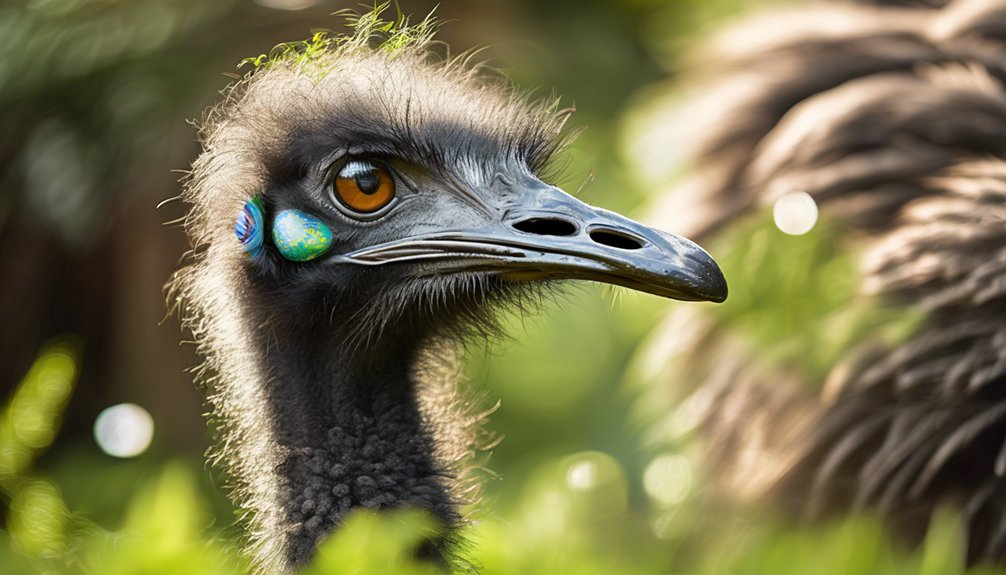
How do male emus exhibit their caregiving traits? You'll find their caregiver behavior is strikingly attentive.
Once the eggs hatch, the male emu takes on the primary role, showcasing nurturing instincts that are both protective and supportive. He stays close to the chicks, guiding them through their early days with patience and vigilance.
You'll notice his gentle nudges as he encourages them to explore their surroundings, ensuring they gain confidence. This instinctive behavior is crucial for their survival, as he instinctively knows when to shield them from potential threats.
The Impact of Environmental Factors on Parenting
While various environmental factors shape parenting behaviors in emus, the availability of resources plays a pivotal role in determining their caregiving efficacy. Climate effects and habitat changes significantly influence male emus' ability to rear their young. When resources are scarce, their attention may shift, impacting nurturing behaviors.
Consider these factors:
- Food availability: Adequate nutrition supports both the caregiver and the chicks.
- Water sources: Essential for hydration and survival.
- Shelter: Protects against harsh weather conditions.
- Predator presence: Affects safety and stress levels.
- Breeding grounds: Quality habitats enhance reproductive success.
Understanding these dynamics helps you appreciate the delicate balance of nature and how it shapes emu parenting.
Comparisons With Other Bird Species
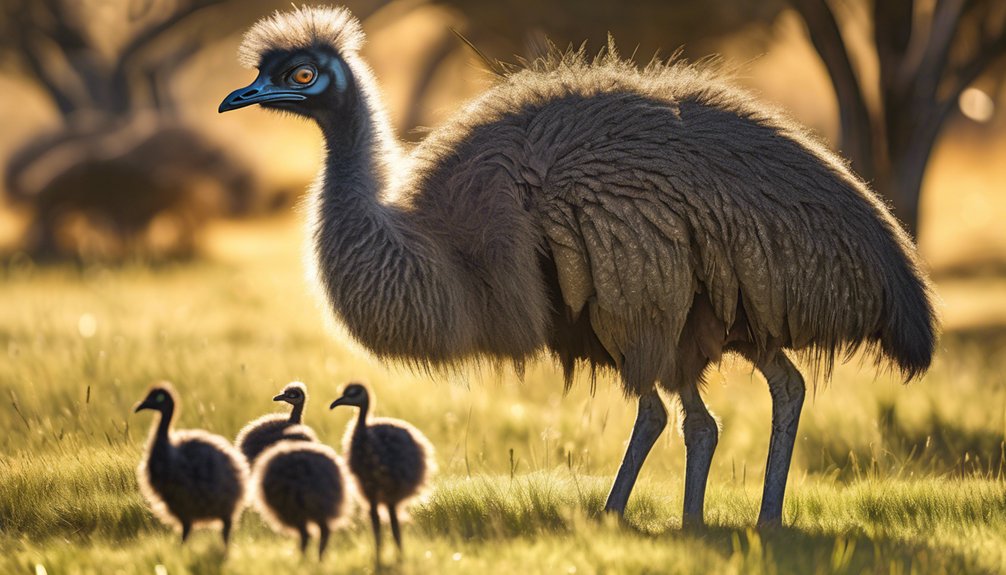
When comparing emu parenting to that of other bird species, you can observe notable differences and similarities that illustrate their unique adaptations.
For instance, while male emus take on the primary role in nurturing, many bird species, like penguins, share parental duties more equally.
Emus exhibit distinct courtship behaviors, with elaborate displays to attract mates, contrasting with species that rely more on vocalizations or nest-building.
The level of parental investment also varies; emus invest significant time in incubating eggs and caring for chicks post-hatch, while other birds might've shorter involvement.
These variations highlight the diversity in parenting strategies among birds, shaped by environmental pressures and reproductive needs, offering insight into the complex world of avian family dynamics.
Conservation Efforts and Their Influence on Emu Families
Conservation efforts play a crucial role in shaping the dynamics of emu families, as these initiatives directly impact their habitat and population stability. By focusing on habitat preservation and population management, you help ensure that emus thrive in their natural environments.
Here are some key aspects of these efforts:
- Restoration of natural habitats
- Protection from invasive species
- Community education on emu importance
- Monitoring population health
- Legislation supporting emu conservation
These actions not only stabilize emu populations but also foster stronger family units.
When you support conservation, you're not just preserving a species; you're nurturing the bonds that hold emu families together. By understanding this connection, you can appreciate the profound impact of your involvement in conservation efforts.
Frequently Asked Questions
How Do Male Emus Attract Females for Mating?
To attract females for mating, male emus perform elaborate courtship displays and emit distinctive mating calls. You'll notice their rhythmic movements and sounds, creating an enchanting atmosphere that draws potential mates closer in the wild.
What Do Emu Chicks Eat After Hatching?
When it comes to nurturing those delightful little emu chicks, you'll find they thrive on a diet rich in chick nutrition. Their feeding habits initially focus on insects and seeds, fostering their growth and vitality.
How Long Do Male Emus Care for Their Chicks?
Male emus typically care for their chicks for about six to eight months. During this time, they take on significant parental duties, guiding them through their early development and ensuring their well-being through attentive chick care.
Do Male Emus Have Any Natural Predators?
In the wild, male emus face natural threats like dingoes and large birds of prey, while their vast habitats offer some refuge. Balancing survival against these dangers, you gain insight into their resilience and adaptability.
Can Male Emus Bond With Chicks of Other Species?
You'll find that male emus can engage in inter-species bonding, particularly through chick imprinting. Their nurturing nature allows them to form connections with chicks of different species, fostering unique, affectionate relationships in the wild.
Conclusion
In the captivating world of emu parenting, male emus emerge as devoted guardians, nurturing their young with a fierce dedication reminiscent of a sentinel standing watch over a fragile nest. As they incubate eggs and guide their chicks through the wilderness, their parental instincts not only bolster the survival of their offspring but also enrich the ecosystem. Understanding this unique role sheds light on the complexities of avian life and underscores the importance of conservation efforts to protect these remarkable birds.




